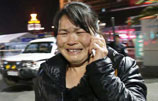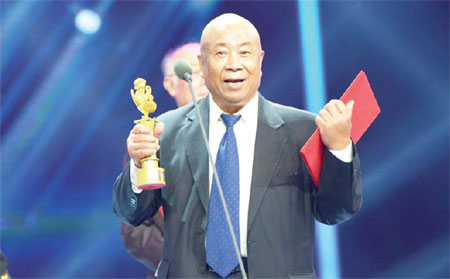'Godfather' of China's filmmakers
Updated: 2014-03-07 10:02
By Raymond Zhou (China Daily Europe)
|
|||||||||||
Without Wu Tianming, renowned film directors such as Zhang Yimou and Huang Jianxin would have had a much more difficult time entering China's film industry and the film revolution created by the so-called "Fifth Generation" might not have happened or at least would not have taken the shape that it did.
Wu Tianming, the enabler of a major chapter in the history of Chinese cinema, died on March 4 from a heart failure. He was 75.
The native of Shaanxi province started making movies in the late 1970s. He was immersed in the traditional style known as "social realism" with many of his stories portraying rural life as unvarnished and bleak, yet totally different from the ones made by his proteges shortly afterwards.
Two of his movies made a huge impact when they were released. Life (1984) is about an urban youth who was sent away to the hinterland and ended up in love with a local girl. He faced the moral dilemma when he had a chance to return to his erstwhile, relatively more prosperous living: either to leave his sweetheart or condemn himself to eternal hardship. It was a dilemma of a whole generation of Chinese youths and an echo of an ancient tale with similar moral quandary. Though retaining a tinge of melodrama, it resonated with a wide swath of the Chinese society at the throes of ridding itself of the vestiges of the "cultural revolution" (19 - 19).
Old Well (1986) is a story about rural villagers fighting for access to precious water in the parched land of northwestern China. It made a veritable acting star out of Zhang Yimou, who won many accolades including the Best Actor award from the Tokyo International Film Festival. The film is still considered a major classic of the realism school of filmmaking.
Had Wu's achievements been limited to film directing, he would have left an important legacy. But what he did shortly after directing these movies cemented his status as the "Godfather" of a new generation of filmmakers who are still active in today's Chinese cinema. From 1984 to 1989, Wu was promoted as head of Xi'an Film Studio, which lies outside the nucleus of the country's filmmaking industry. He turned the peripheral position of the studio into an advantage by using a group of new graduates in projects that deviated sharply from conventional aesthetics.
Under Wu's leadership, a bunch of epoch-making titles were made and, surprisingly, released, among which were Huang Jianxin's The Black Cannon Incident, Tian Zhuangzhuang's The Horse Thief, and mostly prominently Zhang Yimou's Red Sorghum (1987). Prior to that, Zhang was known only as a cinematographer and, yes, a very good actor.
In the early 1990s, Wu stayed in the US, but ended his self-imposed exile and returned to China in 1994. He made a few more movies, of which The King of Masks won some kudos.
In the past decade, Wu received several honorary awards recognizing his contribution to the birth of the Fifth Generation. The enormous pressure he resisted and the generosity he displayed when grooming the younger generation were often played down by him and the press.
The last memorable appearance Wu made on screen was in a leading role in Zhang Yang's comedy Full Circle (2012), about a band of senior citizens tackling with the sunset of life and pondering mortality face to face.
As soon as Wu's death was announced, Zhang Yimou issued a brief statement, expressing his shock at the news and mentioning that he and Wu were developing a project together a few months earlier. Gu Changwei, another director who benefited from Wu's short reign at the Xi'an studio, wrote: "May our chief enjoy his bliss at heaven above!"
raymondzhou@chinadaily.com.cn
|
Wu Tianming receiving an award for his role in Zhang Yang's comedy Full Circle at the closing ceremony of the 20th University Student Film Festival on May 13, 2013. China Photo Press |
(China Daily European Weekly 03/07/2014 page29)
Today's Top News
The search for flight 370 goes on
Obama to meet Ukrainian PM
China to curtail death penalty
Tougher penalty for underage prostitutes
Dailai Lama 'sabotaged ties'
777 vanishes: Malaysia Airlines says so far no evidence of any wreckage
Malaysia plane crashed off coast of Vietnam
'I was supposed to be on that plane'
Hot Topics
Lunar probe , China growth forecasts, Emission rules get tougher, China seen through 'colored lens', International board,
Editor's Picks

|

|

|

|

|

|






